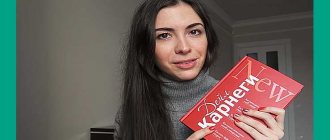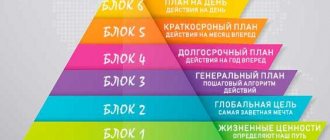Tips for getting the most out of quotes
To get the maximum effect from using quotes about self-development and personal improvement, you can follow these steps:
- Re-read them at least 3 times a week. This will help you maintain confidence in your own actions.
- Choose a few expressions that inspire you the most. Print them out and hang them in a visible place. You can hang them like paintings in your office or study. Every time you look at the images you will remember your goal. You can also set a picture with the saying on your computer or phone desktop.
- If you have difficulty reading literature, then make a bookmark with a quote that encourages self-development. This will make it much easier to read.
- To broaden your horizons, it is advisable to get acquainted with the biography of the author of your favorite aphorism. You can also read his philosophical works.
- Some people are more suited to audio or video formats due to their predominant visual or auditory perception.
Please note: You can review these quotes and listen to them thanks to our video.
Watching a video not only saves time on reading, but also helps to achieve maximum motivation.
"The Law of Success"
A book that I would recommend to people starting to get acquainted with self-development. Napoleon Hill put a lot of meaning into it and described 16 laws of success.
Idea: Determine your main life goal
What I learned from The Law of Success is that every person must determine their main goal in life. A goal based on his principles and expressing all desires.
42 best quotes about self-development and personal improvement
#1 Author - Niels Bohr . An expert is a person who has made all possible mistakes in a very narrow specialty.
#2 Author - Anaxagoras. Nothing can be known, nothing can be learned, nothing can be ascertained: feelings are limited, the mind is weak, life is short.
#3 Author - Charles Montesquieu. You need to study a lot to know a lot.
#4 Author - Georg Simmel An educated person is one who knows where to find what he does not know.
#5 Author - Grigory Landau. Just like with anyone else, you can get used to yourself without ever recognizing yourself.
#6 Author - Henry Hasking. A man who is too old to learn has probably always been too old to learn.
#7 Author - Thomas Szasz. You often hear: “He hasn’t found himself yet.” But you cannot find yourself - you can only create yourself.
#8 Author - W. Shakespeare. Brevity is the soul of wit.
#9 Author - Maria Ebner-Eschenbach A good book contains more truths than the author wanted to put into it.
#10 Author - Ingmar Bergman. Life has exactly the value we want to give it.
#11 Author - Fyodor Dostoevsky. We must love life more than its meaning.
#12 Author - Stanislav Jerzy Lec. The darker it is, the easier it is to be a star.
#13 Author - Wieslaw Brudzinski. The mistakes of young people are an inexhaustible source of experience for those who are older.
#14 Author - Dominik Opolsky. You won't be able to find yourself by following your trail.
#15 Author - Grigory Landau. To find yourself, you need to remake yourself.
#16 Author - Grigory Landau. Glory is a love accessible to few; love is glory available to everyone.
#17 Author - Isaac Newton. When learning science, examples are more useful than rules.
#18 Author - Vernon Lowe. Experience is the worst teacher; he offers a test before class.
#19 Author - Johann Wolfgang Goethe. We, in essence, learn from those books about which we are not able to judge. The author of a book that we can judge should have learned from us.
#20 Author - Georges Feydeau. If you are lazy and persistent, you will certainly achieve something.
#21 Author - Lawrence Peter. There is nothing new under the sun, but there is something old that we don't know.
#22 Author - Jules Renard. The more you read, the less you imitate.
#23 Author - Victor Grzegorczyk. Wisdom is not wrinkles, but convolutions.
#24 Author - Franklin Jones. Originality is the art of hiding your sources.
#25 Author - Alexander Perlyuk. What is said directly is understood worse than a hint.
#26 Author - Fyodor Dostoevsky. A person does not live his whole life, but creates himself, creates himself.
#27 Author - Napoleon I. Power is never funny.
#28 Author - Thales of Miletus. Know yourself!
#29 Author - Evgeny Sagalovsky. It is not enough to know your worth - you also need to be able to realize yourself.
#30 Author - Stanislav Jerzy Lec. To be yourself, you need to be someone.
#31 Author - Blaise Pascal. Otherwise, the words arranged take on a different meaning, otherwise the thoughts arranged make a different impression.
#32 Author - Samuel Johnson. Knowledge is of two kinds: either we know something, or we know where to find information about it.
#33 Author - Lech Konopiński. Only the unique should be repeated.
#34 Author - Francois Fenelon. The more you say, the less people will remember.
#35 Author - Lawrence Peter. What could be more painful than learning from experience? Just one thing: don't learn from your own experience.
#36 Author - Jean Duch. Lack of experience allows youth to do what old age considers impossible.
#37 Author - Anton Chekhov. A smart person loves to learn, and a fool loves to teach.
#38 Author - Seneca. By teaching others, we learn ourselves.
#39 Author - Gilbert Chesterton. Intellectuals are divided into two categories: some worship intelligence, others use it.
#40 By Henry Wheeler Shaw. The less we know, the more we suspect.
#41 Author - Stephen Fry. Original thought? Nothing could be easier. Libraries are simply filled with them.
#42 Author - Henry Peter Broome. Try to know everything about something and something about everything.
"Biography of Benjamin Franklin"
To be honest, I didn't finish reading this biography. She seemed boring and uninteresting to me, and I didn’t waste time on her. Fortunately, I read to the point that really turned out to be useful for me.
Idea: Keep a record of virtues
I devoted a separate article to this idea - Character traits that every person should observe, according to Benjamin Franklin. But in order not to force you to jump back and forth around the site, I will explain the main points here.
In his youth, Benjamin Franklin defined for himself 12 virtues, or in other words, rules of behavior that he adhered to throughout his life. For brevity, I have prepared a table of these virtues below.
| Monday | Tuesday | Wednesday | Thursday | Friday | Saturday | Sunday |
| Abstinence Do not eat to the point of overeating, do not drink to the point of intoxication. | ||||||
| Communication Saying things that will benefit me or others. | ||||||
| Order Keep things in their place; Set aside separate time for each lesson. | ||||||
| Determination Don't put off until tomorrow what you can do today. | ||||||
| Thrift Do not spend money on unnecessary things; Save. | ||||||
| Hard work Don't waste time; Always be busy with something useful; Refuse unnecessary things. | ||||||
| Sincerity Do not deceive; Have pure and fair thoughts towards others | ||||||
| Justice Do not harm anyone; Don't miss out on good deeds; Do not commit injustice. | ||||||
| Moderation Contain feelings of resentment. | ||||||
| Cleanliness Maintain personal hygiene, neatness in clothing and order in the house. | ||||||
| Calmness Don't worry about trifles. | ||||||
| Modesty Monitor behavior; Show respect for others |
Every day, mark the points that you violated. This way you will be aware of your progress.
"The Millionaire's Secret"
The main goal of the book is to reveal the secrets of wealth. The book is fascinating because the author wrote it in the style of a story about a poor man who becomes acquainted with the principles of wealth.
Idea: Set financial goals for one, two, five years, etc.
The first step to wealth is to identify what you want and set a financial goal based on that. This is exactly the thought I took from the book.
Financial goals include:
- A certain amount of money
- Time index
Your financial goal might look like this: “In five years from today, I will make my first million.” 1 million is a certain amount that you want to achieve. And 5 years is the time during which you plan to earn this million.
"The Monk Who Sold His Ferrari"
A book with an attractive title, but with too much higher meaning.
Idea: Think positively. Get rid of negative thoughts
Throughout the book, the author inspires us that every person is able to control his own flow of thoughts. You need to learn this skill, and then you will be able to cut off all negativity without any problems.
Related materials:
CHANEL | SEPHORA COLLECTION | Ivan Kulibin | Heinrich Schliemann | Konstantin Tsiolkovsky | Thomas Edison | Coco Chanel | invention | inventor | ideas | Chanel | Sephora | Givenchy | Givenchy | Clarisonic
Articles
- Loser students October 17, 2014, 00:00
- My light, mirror, tell me... January 27, 2021, 00:00
- Insta-trend: Jelly Nail August 07, 2021, 00:00
Video
- Fall-winter 2010 from Givenchy August 31, 2010, 07:20
- Beauty in Korean October 24, 2021, 12:00
- New Year's collection FROSTED PARTY from SEPHORA COLLECTION November 18, 2021, 00:00
Walt Disney
Walt Disney's childhood was not easy. His dream of becoming a cartoonist began at the age of 12. He persistently offered his “masterpieces” to all publishing houses and magazines, but he was rejected everywhere, never seeing real talent in the young illustrator.
Only at eighteen he was lucky enough to get a job as a cartoonist, from where he was soon kicked out in disgrace, arguing that he was professionally unsuitable. This failure gave Walt the idea of starting his own business. He realized this idea together with his best friend. The business generated $135 in revenue before failing.
Disney took up his old ways again - he drew illustrations for cartoons in the garage. But his first work, Alice in Wonderland, was a failure. Shortly thereafter, Walt created a completely new character that became profitable: Oswald the Rabbit. And this idea was stolen by an insidious attacker.
Despite all the unsuccessful attempts to achieve success, Walt did not stop moving towards his goal, working persistently and persistently in this direction. As a result, Donald Duck and Mickey Mouse were “born”, who conquered the whole world and became the beginning of the company’s success story. One of the fascinating books about the biography of Walt Disney is called: “It All Was Started by One Mouse.” As soon as things started to go up, competitors deprived him of his friend and companion, luring him to their side, which was a strong blow for Walt. And he broke down. He went on a drinking binge and even attempted suicide.
He was rescued and Walt began to slowly but surely climb out of this hole, struggling with depression and financial collapse. He distributed souvenirs with images of his cartoon characters, thanks to which he raised the necessary amount for “Snow White”. Overcoming obstacle after obstacle, step by step Disney moved towards his goal, and he achieved it.
"The Path to Financial Independence"
Another finance book on our list that includes a lot of useful thoughts and ideas. The author of this bestseller is Bodo Schaefer, a world-renowned financial advisor.
Read also:
A consistent path to wealth and financial independence for beginners | 11 steps
Idea 1: Keep records of income and expenses
If you don’t bother to control your income and expenses, then don’t be surprised that money mysteriously always disappears somewhere.
Idea 2: Carry 5,000 rubles with you
Of course, this is not Bodo Schäfer's literal advice. It would be strange if a foreign author measured money in rubles. But, if we translate it into our terms, that’s what he meant.
You should take money with you not to spend it, but to increase your confidence.
A 5,000 ruble note will boost your confidence. By putting money in your pocket, your gait will immediately become smoother, and you yourself will feel richer.
Start with 1000 or 500 rubles if you don’t have 5000 yet.
"Magic of the Morning"
If you count the advice and ideas of the authors that I applied in my life after reading, then “Magic of the Morning” is definitely the leader. Although I only made one point on my list, know that there are many other useful tips in this book.
Idea: Miracle Morning Ritual
This “ritual” radically changed my life. Thanks to him, now I get up at 7, 6, or even 5 in the morning without any problems.
The point of “The Miracle Morning” is that in the evening you establish a reason to get up the next day. For myself, I set several goals that I commit to accomplishing in the morning. This is a certain routine that my morning cannot do without.
Here's an example of my typical morning:
- Wash;
- Do exercises;
- Write down your plan and goals;
- Take an English lesson;
- Reading a book for 20 minutes;
- Breakfast;
Do you understand? This to-do list forces me to get up earlier because I will simply be late for school.
"What do you really want"
The book teaches teenagers to set goals and achieve them. Therefore, the idea that I took from the book is appropriate.
Read also:
50 tips for teenagers that will help them in the future
Idea: Keep a goals journal
A notebook of 48 sheets will do. First you need to divide it into 2 halves. The first is for recording for any purpose. The second is for recording all thoughts and notes that will help achieve this goal.
OK it's all over Now.
“Think big and don’t slow down”
And this is a book by Donald Trump, in which the main message is the scale of thought. Here's the advice I took from it.
Idea: Trust your intuition and listen to your instincts
Often, in order to make the best and fastest decision, you need to listen to your intuition.
"The ABC of Money"
The second book from Bodo Schaefer’s “The Path to Financial Independence” series. Mainly suitable for teenagers and children..
The story of a dog named Money who teaches a 12-year-old girl the secrets of money is great for teaching financial literacy to young readers.
Read also:
How to start living on interest from income for beginners | Fundamentals of investing money
Idea: Keep a success journal
Get a notebook and write down 5 significant events of the day every day. All the things you did best. These could be new acquaintances, new ideas, discoveries, or victories.











